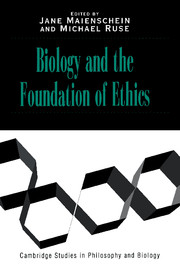Book contents
- Frontmatter
- Contents
- Introduction
- 1 Aristotle on the Biological Roots of Virtue: The Natural History of Natural Virtue
- 2 The Moral Status of Animals in Eighteenth-Century British Philosophy
- 3 From Natural Law to Evolutionary Ethics in Enlightenment French Natural History
- 4 French Evolutionary Ethics during the Third Republic: Jean de Lanessan
- 5 The State and Nature of Unity and Freedom: German Romantic Biology and Ethics
- 6 Darwin's Romantic Biology: The Foundation of His Evolutionary Ethics
- 7 Nietzsche and Darwin
- 8 Evolutionary Ethics in the Twentieth Century: Julian Sorell Huxley and George Gaylord Simpson
- 9 The Laws of Inheritance and the Rules of Morality: Early Geneticists on Evolution and Ethics
- 10 Scientific Responsibility and Political Context: The Case of Genetics under the Swastika
- 11 The Case against Evolutionary Ethics Today
- 12 Biology and Value Theory
- Notes on Contributors
- Index
6 - Darwin's Romantic Biology: The Foundation of His Evolutionary Ethics
Published online by Cambridge University Press: 06 July 2010
- Frontmatter
- Contents
- Introduction
- 1 Aristotle on the Biological Roots of Virtue: The Natural History of Natural Virtue
- 2 The Moral Status of Animals in Eighteenth-Century British Philosophy
- 3 From Natural Law to Evolutionary Ethics in Enlightenment French Natural History
- 4 French Evolutionary Ethics during the Third Republic: Jean de Lanessan
- 5 The State and Nature of Unity and Freedom: German Romantic Biology and Ethics
- 6 Darwin's Romantic Biology: The Foundation of His Evolutionary Ethics
- 7 Nietzsche and Darwin
- 8 Evolutionary Ethics in the Twentieth Century: Julian Sorell Huxley and George Gaylord Simpson
- 9 The Laws of Inheritance and the Rules of Morality: Early Geneticists on Evolution and Ethics
- 10 Scientific Responsibility and Political Context: The Case of Genetics under the Swastika
- 11 The Case against Evolutionary Ethics Today
- 12 Biology and Value Theory
- Notes on Contributors
- Index
Summary
I am at present fit only to read Humboldt; he like another Sun illumines everything I behold.
Charles Darwin, Beagle DiaryOn learning that Alexander von Humboldt's health had worsened, Darwin wrote to his friend Joseph Hooker, then in Paris:
I grieve to hear Humboldt is failing; one cannot help feeling, though unrightly, that such an end is humiliating: even when I saw him he talked beyond all reason. – If you see him again, pray give him my most respectful & kind compliments, & say that I never forget that my whole course of life is due to having read & reread as a Youth his Personal Narrative.
[Darwin 1985–, vol. 3, p. 140]Alexander von Humboldt – romantic adventurer, friend of Goethe, and the very doyen of German science in the first half of the nineteenth century – had preceded Darwin to the Americas. He wrote of his explorations in Personal Narrative of Travels to the Equinoctial Regions of the New Continent, during the Years 1799–1804, and elaborated their findings in his greatly celebrated Cosmos. These two multivolume books had a tremendous impact on Darwin and helped forge the romantic conception of nature that underlay his theory of evolution. That romantic conception reveals itself most perspicuously in the moral evaluation of nature and man that Darwin plaited through his two principal works: the Origin of Species and the Descent of Man.
Darwin's conceptions of nature and man have, of course, typically been regarded as the very antithesis of the romantic. The moral theory most often ascribed to him harks back to Hobbes: ethical propositions are presumed to be merely flimflam for efforts at selfish aggrandizement.
- Type
- Chapter
- Information
- Biology and the Foundations of Ethics , pp. 113 - 153Publisher: Cambridge University PressPrint publication year: 1999
- 8
- Cited by



